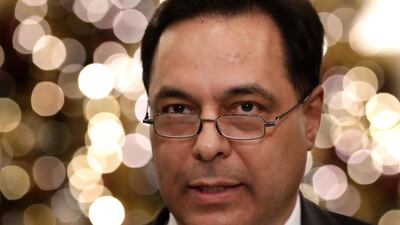After nearly two months without a leader or a government while a major financial crisis looms on the horizon, Lebanese politicians have chosen a prime minister expected to lead the nation out of its current deadlock.
Hassan Diab is not officially a member of any political party but he is backed by Hezbollah and its allies. He is a relatively unknown politician and was working as a professor and vice president at the American University of Beirut, when he was assigned the job on Thursday. Mr Diab has been tasked with an almost impossible mission: to save a country on the verge of economic collapse, one which has been rocked by nationwide protests since October 17. But little is known about Mr Diab’s political ideas and his tangible achievements, aside from the abundance of academic papers, biographical details and inspirational quotes he has previously shared with the world via his website.
His tenure as minister of education from 2011 to 2013 as part of former prime minister Najib Mikati’s Hezbollah-leaning government – the only cabinet position he has ever held prior to his nomination as prime minister – was marked by the renaming of a public school after his late mother, as well as publishing books costing the ministry an estimated $50,000 on what appears to be Mr Diab’s favourite topic: his life, aspirations and accolades. They included a 1,000-page publication titled Documentary of Events During Minister Hassan Diab’s Term at the Ministry of Education and Higher Education, detailing all the events he attended and speeches he gave as minister.
Protesters have queried whether these credentials and others cited on his 134-page curriculum vitae, available online, qualify him for the toughest job in Lebanon. In a section on his website entitled My Vision, he includes inspirational quotes by renowned men of letters, from Confucius to Ralph Waldo Emerson, whose words of wisdom are interspersed with citations from his own speeches. He writes, for example, that what he envisages “is nothing less than changing the world but I realise that the first step is to change oneself” – a laudable, if aspirational, intention and one that Lebanese citizens will no doubt be holding him to account for in the coming weeks.
So far, his profile has yet to convince Lebanese protesters to go home, or that the president has finally found the right person to end endemic corruption and mismanagement of government funds, and reform the country’s political system. Demonstrations continued over the weekend after Mr Diab’s nomination failed to secure Sunni support, even from Mr Mikati and his bloc, under which he had served. The only members of parliament who backed his nomination belong to Hezbollah and its allies Amal and the Free Patriotic Movement – a worrying sign of the group’s attempts to subvert the delicate balance of Lebanese politics. That Mr Diab comes with the backing of the likes of caretaker foreign minister Gebran Bassil – a man whose polarising rhetoric has stigmatised Syrian and Palestinian refugees – is deeply disconcerting. This does not bode well for the future of Lebanon as a Hezbollah-backed prime minister could attract more US sanctions and steer the country further away from the international community and its historic allies in the Arab world, at a time when Beirut needs them most.
Mr Diab has denied the claim that he is beholden to Hezbollah and insists he is the technocrat the protesters have been calling for to head a government of experts without political affiliations, one of the key demands of the uprising. He says he will prioritise winning support from US and western allies. Hezbollah and its affiliated groups oppose the idea of a government composed solely of technocrats and have been lobbying for a cabinet that includes sectarian politicians. Whether Mr Diab will manage to nominate a more neutral government and stand up to the very leaders who have made his political career so far remains to be seen. For the sake of Lebanon, one can only hope he will stick to his declaration to make his country – if not the world – a better place.

